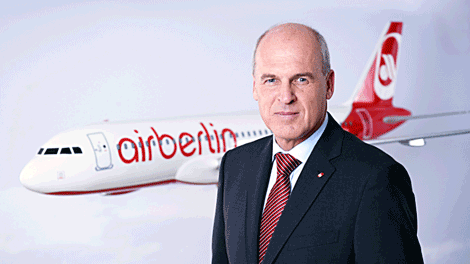
From Dusk
‘til Dawn
Air Berlin (AB) is in serious trouble,
and not for the first time. This time, however, it is unclear whether
the troubled carrier will see the sun rise again.
AB has been battling mounting debt, increasing
customer dissatisfaction, and low yields—even lower than European
average—for quite awhile, but now they are under crossfire
by competitors who aim to capitalize on what sources say are AB’s
weaknesses and unclear business model:
Ryanair (FR), the enfant terrible of the
LCCs in Europe, is poised for further expansion and is attacking
AB head on.
For example, FR announced the re-start
of German domestic flights for the winter schedule; but they will
now start in September on the profitable Cologne-Berlin route.
Currently, about 44 flights are flown between
CGN and BER daily, about half by LH low-cost subsidiary Germanwings
(4U) and half by AB. FR also plans to initially base five aircraft
in BER and offer five daily connections between BER and CGN for
starters.
And FR introduced itself in no unclear
terms, offering prices in the 20 Euro (U.S. $22.75) range, which
were immediately matched by 4U, and then were lowered to 10 Euro
(U.S $11.38) one-way.
FR has made clear that they wish to tackle
AB’s position as second largest German carrier, and it is
hard to see how AB can fight back.
 While a price war is hard to win in any case, AB simply doesn’t
have the financial resources at their disposal, while cash-rich
FR has announced that they intend to serve “all major German
airports except FRA before the end of 2016.” But with FR’s
existing services to Frankfurt-Hahn (HHN), they may well compete
in the low-cost sector for passengers who do not mind a 90-minute
bus ride, even in FRA.
While a price war is hard to win in any case, AB simply doesn’t
have the financial resources at their disposal, while cash-rich
FR has announced that they intend to serve “all major German
airports except FRA before the end of 2016.” But with FR’s
existing services to Frankfurt-Hahn (HHN), they may well compete
in the low-cost sector for passengers who do not mind a 90-minute
bus ride, even in FRA.
Stefan Pichler, (right) the current CEO
of Air Berlin, took over for Wolfgang Prock-Schauer on February
1, 2015. Many of AB’s issues are rooted in decisions made
by Joachim Hunold (who led AB’s disastrous expansion in the
1990s and early 2000s and reportedly also owned most of the aircraft
AB operated by means of various foundations, leasing them to AB
at well above market rates) and former controversial CEO Hartmut
Mehdorn, nicknamed “sanitizer” in Germany, and later
the CEO of the no-less troubled Berlin-Brandenburg airport until
March 31st, 2015. Mehdorn followed Hunold in 2011 and stepped down
in 2013.
Although Air Berlin is advertised as a
“German” carrier and it bears the German capital in
its name, since 2006 AB has been headquartered in Rickmansworth,
UK—allegedly for tax reasons. Former CEO Joachim Hunold created
today’s AB by integrating former German holiday carrier LTU,
Deutsche BA (The German subsidiary of British Airways), the Austrian
NIKI, and the Swiss Belair.
AB has a somewhat colorful history: Founded
in 1978 by U.S. citizen Kim Lundgren, it was headquartered in Miami
because until the German reunification and dropping of the allied
air traffic restrictions in 1990, only aircraft registered in one
of the allied states were permitted to operate to and from Berlin.
In 1991, when Joachim Hunold took over, the registry was moved to
Germany and the business model changed entirely.
While the focus on nearby sun destinations
such as ever-popular Palma de Mallorca (PMI) paid off, the mounting
debts of AB proved to be a heavy burden, which Hunold tried to alleviate
by further expansion. Attempts to take over German holiday carrier
Condor (DE) in 2007 and Germania (ST) in 2008 however failed.
As the attempts to diversify the newly
created carrier were not well thought through, AB was neither a
full-fledged legacy carrier such as Lufthansa (LH) nor really a
charter or holiday carrier anymore, such as SunExpress (XQ) or Condor
(DE).
Air Berlin resorted to measures that usually
spell doom for most airline businesses—selling off what little
assets they had and leasing them back, plus outsourcing whatever
activity could be outsourced.
These activities prompted the joke that
Mehdorn, CEO of AB at that time, “was an avid believer in
being able to make a Ponzi scheme work out.”
Air Berlin had divested themselves of aircraft,
buildings, ULDs, and even spare engines and crew uniforms. With
the damsel already in the greatest distress, the knight in shining
armor arrived in December 2011, when Etihad (EY) upped their share
from 2.99 percent to 29.21 percent at a cost of 73 million Euros
(U.S. $93 million) in order to gain a better foothold in the German
market.
In March 2012, AB joined Oneworld and thus
gained access to additional routes and destinations of the Oneworld
partners. This measure wasaimed at targeting business and leisure
travelers who valued interconnectivity; however, the cutbacks in
staff and systems gave AB a notorious reputation for not dealing
with customer complaints and inquiries. According to figures obtained
by the German business daily HANDELSBLATT in August 2013, more than
30,000 complaints at AB were unresolved at that time and many were
closed without any response to the customer. The average time it
took AB to respond to any inquiry or complaint was eight months.
Subsequently, load factors on holiday and
business routes were not as expected, so AB resorted to giving up
routes and shrinking both network, staff, and fleet in order to
ferry passengers into AUH where they connected to EY flights onwards.
As cash was running out again, AB resorted to selling their frequent
flyer program called “TopBonus” to EY for 184 Million
Euros (U.S. $234.5 million) in December 2012.
Further measures included AB taking over
cabin interiors that had been replaced at EY in favor of more modern
equipment, joint maintenance for aircraft, and staff reductions—measures
well received by the stock market, but not so much by the flying
public, who started to see AB as an EY subcontractor at best.
After the 2013 earnings report showed losses
of 314.5 million Euros (U.S. $400.8 million), AB’s bankruptcy
was avoided by its knight EY who—albeit reluctantly—had
again provided a third-tier convertible bond totaling 300 million
Euros (U.S. $383 million). Although it rescued AB from immediate
doom, this measure proved to be a double-edged sword since it not
only made the German air transport watchdog, the LBA, question the
financial standing of AB and its business model, but also understandably
angered competitor LH who saw these measures as an illegal aid to
the struggling competitor.
A 3rd tier convertible bond gives the creditor
the option to convert the loan into shares at a given date. However,
EY is unable to exercise this option since it would raise EY’s
share beyond the 50 percent limit, which would make AB lose its
European registry.
Similar doubts about the financial standing
of former Air Cargo Germany (6U) resulted in immediate revocation
of ACG’s operating permit on April 18th, 2013.
 The LBA’s doubts about the validity
of AB’s business model materialized in early October 2014
when the LBA refused to sign off on 34 EY/AB codeshare flights which,
according to the LBA, “were not in accordance with the bilateral
air services agreement between Germany and the UAE.” Although
these codeshare flights had been approved in the previous six years,
the LBA insisted that there was no legal basis for further approval,
likely based on AB’s questionable financial standing and their
rebuilt business model as a feeder for EY and its subsidiaries.
The LBA’s doubts about the validity
of AB’s business model materialized in early October 2014
when the LBA refused to sign off on 34 EY/AB codeshare flights which,
according to the LBA, “were not in accordance with the bilateral
air services agreement between Germany and the UAE.” Although
these codeshare flights had been approved in the previous six years,
the LBA insisted that there was no legal basis for further approval,
likely based on AB’s questionable financial standing and their
rebuilt business model as a feeder for EY and its subsidiaries.
Although German minister for transport
and infrastructure Alexander Dobrindt had ordered the LBA to approve
the code share flights in question, the LBA insists that no precedent
had been set, leaving AB’s most viable business in question.
In the meantime, AB has announced it will
reduce capacity (4.5 percent less seats offered in the March to
June period of 2015 than in 2014) and its 2014 earnings report showed
even greater losses of 377 Million Euros (US$429.11 million ).
Although CEO Stefan Pichler says that he
is “cautiously optimistic” about getting AB back into
the black in 2016, with the attack launched by FR and the uncertain
future of their codeshare flights with EY, that seems more than
questionable. For EY, it may be more commercially viable to finance
the upstart of an Alitalia Germany.
Jens/Geoffrey |





